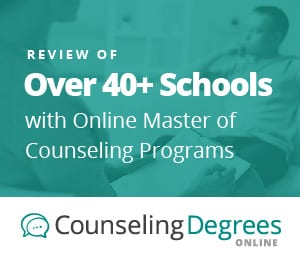Overview of College Counseling Degrees and Job Description
The decision of which college or university to attend (or, whether to attend college or university at all) can change the trajectory of a student’s life. It can be a difficult decision to make, and without the right guidance, it may seem overwhelming.
The role of college counselors is to help young people understand their options and carefully think through the logistical, financial, and academic implications of their chosen path. Additionally, college counselors can help students identify the best strategies for being accepted to the college of their choice, for choosing the right major, or even for receiving the optimal amount of financial aid.
College counseling degrees can provide the knowledge base and social skills necessary to succeed in this position and make a lasting difference in the lives of students.
Consider a Featured Online Counseling Program
| School and Program Information | Online Program? Entry Requirements |
Course Information |
|---|
*Sponsored Counseling Programs
Online CACREP Accredited programs | Online MPCAC Accredited programs
What Can You Do With a College Counselor Degree?
College counselors can work in different settings, including high schools, colleges, or even state agencies. In high schools, college counselors often work with the school system to help analyze and plan for each student’s individual needs.
Through interviews, counselors can determine the dreams and aspirations of each student. This process helps the counselor to put the student in contact with universities that can provide the best degree program for what the student desires. To be effective in their position, counselors should stay up to date with the general admission requirements of colleges, the admission process, the prerequisite requirements for different programs, and the educational stipulations that students must abide by during high school education.
College counselors provide several important services to the students they serve, using the skills they master in their college counselor degree program:
- Helping students with administrative tasks including starting the college application process, applying for financial aid, and coordinating college visits
- Assisting in securing relevant paperwork, such as transcripts and letters of recommendation
- Working with new college students to obtain room and board, become accustomed to using financial aid funds, and deal with any psychological effects of becoming independent
- Directing students to college campus resources and programs that address on-campus sexual abuse, alcohol abuse, and bullying, for example
- Working in state agencies with adults who are considering returning to school
Featured College Counseling Certification Programs
Becoming a college counselor can include earning a bachelor’s or master’s degree. However, certificate programs may give students more specialized knowledge in their chosen discipline without having to complete another college counselor degree program. Knowing about certification programs is a key step in how to become a college counselor.
UCLA — Online College Counseling Certificate Program
The online College Counseling Certificate program from UCLA has a seven-course requirement that can teach students how to assist high school and college students with their next educational or professional steps. This program can expand on the skills of current high school counselors, providing expertise in collegiate education, providing specific knowledge of college and high school requirements, and connecting students with different resources and services. The program can normally be completed between one and two years.
Some sample courses from this program are:
- Introduction to Counseling for College Admission
- Financial Aid Fundamentals
- Testing/Career Assessment
University of California, Riverside — Professional Certificate in College Admissions Counseling
For those who want to help students transition to collegiate education, the College Admissions Counseling certificate from the University of California, Riverside, could be a great choice. This program is designed for counselors, teachers, or individuals who want to work in college counseling. It covers topics including college admissions and finances, working with underrepresented communities, and preparing students for college entrance exams. The entire program consists of 18 units and can be a great complement to bachelor’s- and master’s-level degrees.
Some sample courses from this program are:
- The College Counseling Process
- Financial Aid Planning for Higher Education
- Professional and Ethical Issues in the College Application Process
Why Do We Need College Counselors?
There are large numbers of people each year searching for the right educational program. Choosing the right degree and school can be complicated, especially for those who have little experience in the workforce or for those who have little support from outside resources. College counselors are great resources for students throughout their transition into higher education, especially if they are unsure of how to make that transition.
College Counselor Salary and Career Outlook
According to the latest data from the U.S. Bureau of Labor Statistics (BLS), school and career counselors make a median annual salary of $58,120 per year, with a projected growth rate of 11% between 2020 and 2030. Note that salaries can vary based on location, experience, and certification.
The proliferation of online degree programs is adding to the pool of students across the country pursuing a college education. More people are finding the time to take part in flexible remote college degree programs that are easier to manage with a busy lifestyle. With this influx of students, the need for college counselors is likely to increase as well.
As you consider whether a college counseling program is right for you, take the time to research the job availability in your area. You may be surprised to see how many colleges and agencies are seeking educated professionals to help others start their college advancement.
Do You Need a Master’s in College Counseling?
The educational requirements for how to become a college counselor can vary based on individual aspirations or career goals. Some college counseling positions only require a bachelor’s degree in any subject. However, you may want to pursue licensure to provide counseling services to students and adults. Take a look below at some of the common paths to become a college counselor, including programs that offer a master’s in college counseling.
Bachelor’s Degree in Counseling
At the minimum level, students should earn a bachelor’s degree from an accredited university. The most common degree requirement to become a licensed counselor is a bachelor’s in counseling or psychology. Through four years of undergraduate education, students can learn to properly assess the needs of their clients to provide the best possible service.
While counseling, psychology, and sociology are common subjects of study for school counselors, other degrees can qualify candidates to become college counselors as well. However, students who have degrees in nonpsychological disciplines may find that their career options and growth are more limited because they are typically not able to counsel students outside of their program of study. For instance, a student who receives a bachelor’s degree in political science may have the option to counsel students entering into the political science program, but not students wishing to earn other degrees.
Master’s Degree in Counseling
If you want to provide psychological counseling services through colleges and universities, you will be expected to earn a minimum of a master’s degree in counseling or psychology. Master’s in college counseling programs focus on the different techniques and abilities required to counsel people in need of guidance. Most programs at this level can be completed in two to three years and include supervised practical experience, but these requirements may vary based on the program and state regulations.
Master’s in counseling programs include the following:
Licensure
While licensure is not always required for college counseling positions, many graduates choose to pursue it to expand their capabilities as a professional. As such, it can be an important step in how to become a college counselor.
While state guidelines may vary, becoming licensed within any state requires students to have a minimum of a bachelor’s degree in counseling or psychology from an accredited university. In addition, graduates normally must also take part in one to two years of supervised work experience and successfully pass a state board examination in counseling. Once these requirements have been completed, graduates may apply for licensure.
Find the Right College Counseling Degree for You
If you want to advise students to take the next step or their education, then college counseling may be the right career for you. Earning a college counseling degree can equip you with the knowledge and skills needed to make a difference in students’ lives. Explore some further resources and take the first step towards a career in college counseling.
Sources:
Council for the Accreditation of Counseling and Related Educational Programs, Counseling Specialties
National Board for Certified Counselors
UCLA, College Counseling
University of California Riverside Extension, College Admissions Counseling
U.S. Bureau of Labor Statistics, School and Career Counselors and Advisors











